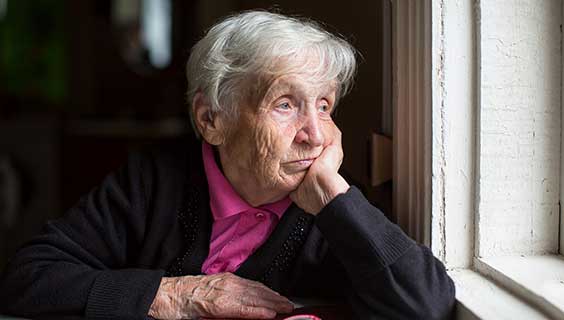As aging seniors face the loss of friends and increasing health challenges, maintaining social connections becomes more difficult. A 2020 report by the National Academies reveals that approximately one in four adults aged 65 and older are considered socially isolated, a number likely exacerbated by the COVID-19 pandemic.
The Impact of Loneliness and Isolation on Senior Health
If left unmanaged, isolation and loneliness can lead to other health issues such as depression, anxiety, high blood pressure, heart disease, weakened immune systems, and cognitive decline. A study titled “Dementia prevention, intervention, and care” by the Lancet Commission, found that social isolation and loneliness are 1 of 12 contributing factors that may account for a 40% increased risk of dementia in seniors.
How Do We Spot Loneliness?
How do you know if an older adult is feeling lonely? Simply asking them may not always give you the truth. The best approach is to keep an eye on changes in their behavior like changes in sleep or eating habits and a lack of interest in the hobbies and things they used to enjoy.
Here are some ways to identify loneliness in older adults:
- Social Withdrawal: Seniors who feel lonely may withdraw from social activities, family events, or community gatherings. If they were once active participants and now prefer solitude, it could be a sign of loneliness.
- Changes in Communication: Pay attention to changes in communication patterns. Loneliness might manifest through decreased phone calls, visits, or engagement in conversations. If they become less responsive or expressive, it may indicate a sense of isolation.
- Alterations in Routine: Loneliness can lead to a lack of interest in maintaining regular routines. If a senior is neglecting activities they once enjoyed such as hobbies, exercising, or going for walks, it could be a sign that they are feeling lonely.
- Expressions of Sadness or Discontent: Verbal and non-verbal cues like expressions of sadness, sighs, or a generally discontent demeanor can indicate loneliness. Listen to their tone of voice and observe their body language for subtle cues.
- Changes in Sleep Patterns: Loneliness can impact sleep. Seniors who feel isolated may experience changes in sleep patterns, such as difficulty falling asleep, frequent waking during the night, or oversleeping. These changes may reflect emotional distress.
- Decline in Personal Care: Loneliness can affect self-esteem and motivation. If a senior is neglecting their personal care, such as grooming and dressing, it may be a sign that they are struggling emotionally.
- Lack of Interest in Meals: Changes in eating habits can be linked to loneliness. Seniors might lose interest in cooking or eating alone, leading to a decline in nutrition. Keep an eye on their appetite and overall interest in meals.
- Overreliance on Technology: While technology can provide a means of connection, excessive use, particularly if it is due to a lack of in-person interaction, might be a sign of loneliness. Seniors may spend prolonged periods on social media or watching TV as a way to cope with isolation.
6 Ways to Combat Loneliness
- Get a Hearing Test: Hearing loss is a major contributor to loneliness and a good hearing aid can help seniors feel more connected to the conversations around them.
- Foster Relationships: Regular calls and video chats involving friends, relatives, and grandkids can make a huge difference for lonely seniors.
- Volunteer Opportunities: Seniors can often find purpose and make social connections through volunteering in community groups. Encourage them to volunteer or help with community groups or events.
- Physical Activity: Encourage regular exercise for both physical and social benefits. Physical activities such as walks with friends or exercise or dancing classes can help seniors make friends and stay healthy.
- Community Classes: Have them explore local community classes to connect with others and learn new things. Learning helps keep the brain stimulated and may lower the risk of dementia.
- Consider a Senior or Assisted Living Community: Senior and Assisted living communities help foster social connections by providing a calendar of activities and events that keep seniors busy throughout the day.
How Senior and Assisted Living Help Reduce Loneliness and Isolation in Seniors
Senior living communities play a vital role in addressing social isolation among seniors by offering solutions that go beyond physical care. These communities focus on creating an environment that fosters social connections, mental stimulation, and physical activity.
Social Activities Help Seniors Stay Active
One key aspect of assisted living is a complete calendar of social activities. From group outings and cultural events to game nights and fitness classes, assisted living communities provide diverse activities that cater to various interests. These activities help ensure seniors have ample opportunities to engage with others, make friends, and stay mentally and emotionally active.
Transportation Services Keep Seniors From Feeling Isolated
Senior and assisted living communities often provide specialized transportation services that allow seniors to go on shopping trips, outings, and other fun activities accompanied by staff that can address mobility challenges due to aging.
A Holistic Environment Allows Seniors to Thrive
Senior living goes beyond addressing physical needs; it’s about creating an environment where seniors can thrive emotionally, socially, and mentally. By providing a supportive community, a robust calendar of activities, and safe transportation options, these communities actively help combat social isolation and promote a fulfilling and active lifestyle where seniors can flourish emotionally, socially, and mentally.
Are you thinking about senior or assisted living in Los Angeles? If so, contact us. We’re here to help and have the inside scoop on the best senior living communities in LA where seniors can make friends, stay active, and live the good life.


